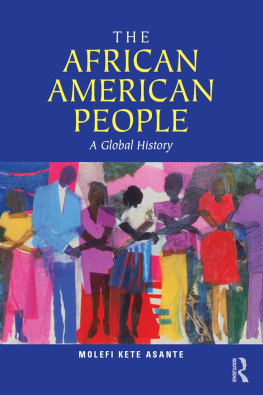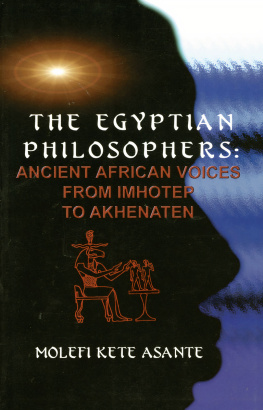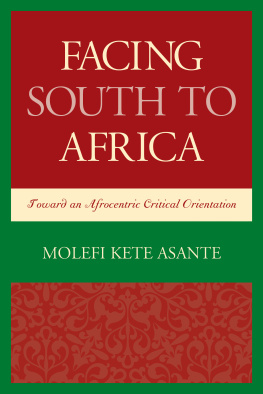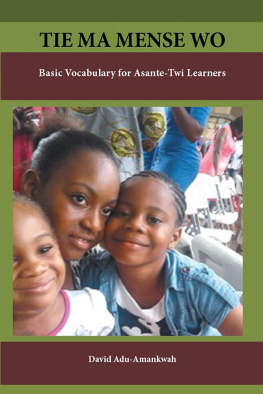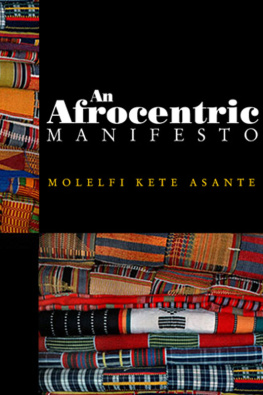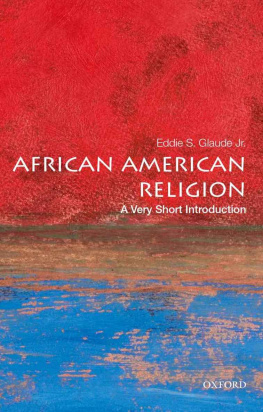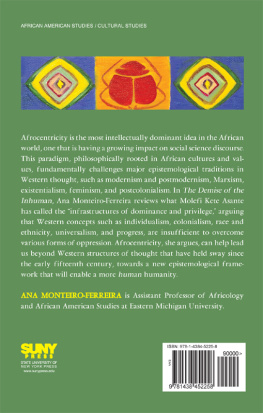The African American People
The African American People is the first history of the African American people to take a global look at the role African Americans have played in the world. Author Molefi Kete Asante synthesizes the familiar tale of historys effect on the African people who found themselves forcibly part of the United States with a new look at how African Americans in later generations impacted the rest of the world. Designed for a range of students studying African American History or African American Studies, The African American People takes the story from Africa to the Americas, and follows the diaspora through the Underground Railroad to Canada, and on to Europe, Asia, and around the globe.
Including over fifty images documenting African American lives, The African American People presents the most detailed discussion of the African and African American diaspora to date, giving students the foundation they need to broaden their conception of African American History.
Molefi Kete Asante is a Professor of African American Studies at Temple University. He is the author of sixty-eight books, including An Afrocentric Manifesto and The History of Africa: The Quest for Eternal Harmony (Routledge).
The African
American People
A Global History
MOLEFI KETE ASANTE
First published 2012
by Routledge
711 Third Avenue, New York, NY 10017
Simultaneously published in the UK
by Routledge
2 Park Square, Milton Park, Abingdon, Oxon OX14 4RN
Routledge is an imprint of the Taylor & Francis Group, an informa business
2012 Taylor & Francis
The right of Molefi Kete Asante to be identified as the author of this work has been asserted by him in accordance with sections 77 and 78 of the Copyright, Designs and Patents Act 1988.
All rights reserved. No part of this book may be reprinted or reproduced or utilised in any form or by any electronic, mechanical, or other means, now known or hereafter invented, including photocopying and recording, or in any information storage or retrieval system, without permission in writing from the publishers.
Trademark notice: Product or corporate names may be trademarks or registered trademarks, and are used only for identification and explanation without intent to infringe.
Library of Congress Cataloging-in-Publication Data
Asante, Molefi K., 1942
The African American people : a global history / by Molefi Kete
Asante.
p. cm.
Includes bibliographical references and index.
1. African AmericansHistory. 2. African AmericansSocial conditions. 3. African AmericansIntellectual life. 4. United StatesCivilizationAfrican American influences. 5. United StatesRace relationsHistory. 6. African diaspora. I. Title.
E185.A796 2012
305.896'073dc23
2011025880
ISBN: 9780415872546 (hbk)
ISBN: 9780415872553 (pbk)
ISBN: 9780203145807 (ebk)
Typeset in Avenir and Dante
by Keystroke, Station Road, Codsall, Wolverhampton
Printed and bound in the United States of America on acid-free paper
by Edwards Brothers Inc.
Contents
List of Illustrations
Tables
Preface
The movement of human history is like a massive star with numerous flares intermittently jutting out into space. At any time one flare might extend out beyond others and assume the role of the dominant edge of the star. In African American history, observers have often seen various flares leaping out as leading themes. For example, there was a phase in historiography where African redemption was the principal approach to African American history. But eventually the Redemptionists who wanted to demonstrate that black people (Africans) were just as capable of achievements and contributions as other people soon discovered that their approach to history was self-effacing and defeatist. They thought that if they could demonstrate the precise event or phenomenon considered by whites to be the one marking blacks as inferior, they could describe the reasons for such thinking, thereby obliterating the racist idea of black incapability. Of course, whenever the Redemptionist historians showed that blacks had achieved in this or that capacity, it was often taken by the racist ideologues to be a form of blacks just imitating whites, and this thinking consequently robbed the Redemptionists of their victory. Another form of African American history was based on the Great Man idea. During the early part of the twentieth century we were inundated with histories that highlighted Frederick Douglass, Booker T. Washington, William E. B. Du Bois and other great men as examples of the black race. This book, on the other hand, has pushed toward a more complex, eclectic portrayal of the African American in a global context. Africans born in the United States have traveled to many countries and influenced the cultures, arts, music, and education in faraway regions of the world. Often when African American history is written, those individuals who left the United States to become expatriates are forgotten and marginalized. While this project strives to include the global reach of the African American, I am the first to admit that this book, as a first attempt at this high goal, has still not included many of the outstanding achievements of African Americans abroad.
In the early 1990s I had occasion to invite Lilly Golden, a second-generation African Russian, to my home in Philadelphia. Dr Golden had been an expert on Africa for the Soviet Union, and after the thaw in political relations between the two nations she had come to the United States. Lillys daughter, Yelena Khanga, accompanied President Mikhail Gorbachev to the United States in 1987. Americans had Condoleezza Rice, but Russians had Yelena Khanga. Lilly Golden herself was the daughter of an African American, Oliver John Golden, and a Jewish American, Bertha Golden, who moved to the Soviet Union in 1931 with sixteen black experts in cotton production. However, Lilly was born in the Soviet Union, educated in Moscow, and married to a Tanzanian, the father of her Yelena. What I learned from listening to Lilly Golden speak about blacks in Russia as she sat in my living room was enough to make me want to write expatriates into the narrative of African Americans. While we know a little about blacks in the old Soviet Union and in Russia from the works of Hugh Barnes, Lilly Golden, and others, this knowledge has not been widely disseminated. For example, we know that Alexander Pushkin, the iconic and legendary Russian writer, was of African descent, but few readers would be aware that there had been blacks in Russia long before the Russian Revolution in 1917. Langston Hughes took twenty-two African American filmmakers and the famous singer Paul Robeson to Russia under the auspices of the Comintern. Some of the descendants of African American expatriates, such as the actor James Lloydovich Patterson, make their own history in the country of their birth, in his case, Russia. There are thousands of African Americans living in Africa, Europe, South America, Asia, and Australia who carry with them intense cultural styles and behaviors that have been shaped by the peculiarly rich history of Africans born in the United States of America.
An increasing number of African Americans have recent roots in the Caribbean and South America, though their earlier origins are on the continent of Africa. Earl Graves, the founder of Black Enterprise magazine and Eric Holder, the first black Attorney General of the United States, both have ancestors from Barbados; Pearl Primus, the dancer, and Kwame Ture, the fiery leader of the Student Nonviolent Coordinating Committee, had Trinidadian backgrounds; and both Marcus Garvey and Colin Powell had Jamaican ancestors. The list of African Americans whose parents or grandparents immigrated to this country from Costa Rica, Cuba, Puerto Rico, Colombia, the Bahamas, Honduras, Brazil, Jamaica, and Haiti is long. In addition, newer immigrants from Nigeria, Ghana, South Africa, Congo, Egypt, Sudan, Senegal, Gambia, Guinea, Somali, and Zimbabwe have enriched the African American experience, making it one of the quintessential ethnic experiences in the United States.


